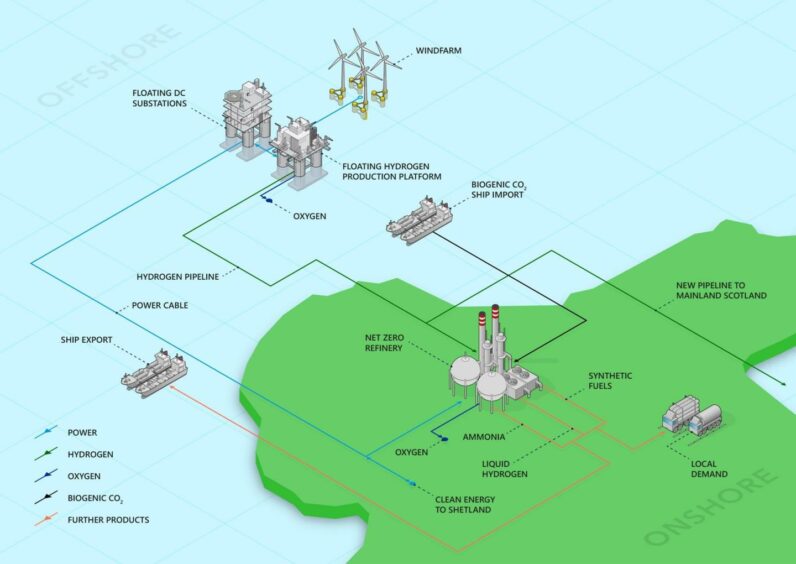Aker has unveiled plans for a green hydrogen production facility in Shetland to help Scotland become “an exporter of clean energy” using North Sea wind resources.
The “Northern Horizons Project” has been unveiled at COP26 by Aker Offshore Wind and Aker Clean Hydrogen, with the former having already announced a sizeable ScotWind bid and hopes to build a huge floating wind manufacturing plant in the country.
The project will utilise floating offshore wind turbines to produce 10GW of energy to power multiple floating installations, which will then produce green hydrogen for onwards transmission to a net zero hydrogen refinery on Shetland.
Hydrogen would be sent to the mainland and exported to fuel-heavy or hard-to-abate industries like shipping and aviation.
The project could start production from 2030, it said and would create “thousands of jobs and the investment of billions of pounds during construction and operation”.
The refinery – powered by floating offshore wind turbines – will produce a range of zero carbon energy solutions for local consumption and export across the world, including ammonia, liquid hydrogen, and synthetic fuels.
According to Aker, enough liquid hydrogen will be produced to power 40 per cent of the total mileage of local UK buses, as well as enough synthetic fuel to make 750 round trips from the UK to New York.
Aker Offshore Wind managing director Sian Lloyd-Rees said: “Such innovation and private sector investment are key to meeting the UK and Scotland’s net zero targets and delivering the unprecedented ambition on display here in Glasgow at COP26.
“This is a technically and economically feasible plan to deliver floating offshore wind at the scale needed to deliver clean energy products which can be used to help decarbonise fuel-heavy industries such as shipping and aviation.”
The firm said the project is a response to the Scottish Government target of 5GW of hydrogen production by 2030.
It has been developed with assurance provider DNV, who is joining the Aker companies on a consultation project with governments and businesses to mature it towards an investment decision.
Ditlev Engel, CEO of Energy Systems at DNV, said: “To meet the targets of the Paris Agreement, the world needs to transition faster to a deeply decarbonised energy system,” said “This will require greater renewable power generation and electrification, but also extending the reach of renewable energy to hard-to-abate sectors that cannot be readily electrified – through conversion to green hydrogen and synthetic fuels.
“I am proud that DNV has worked on this project that really does show a profitable business opportunity creating economic growth and new job opportunities, whilst contributing greatly to the UK’s net zero targets.”
Recommended for you


 © Supplied by Aker Offshore Wind
© Supplied by Aker Offshore Wind